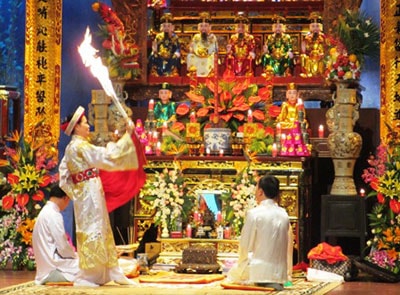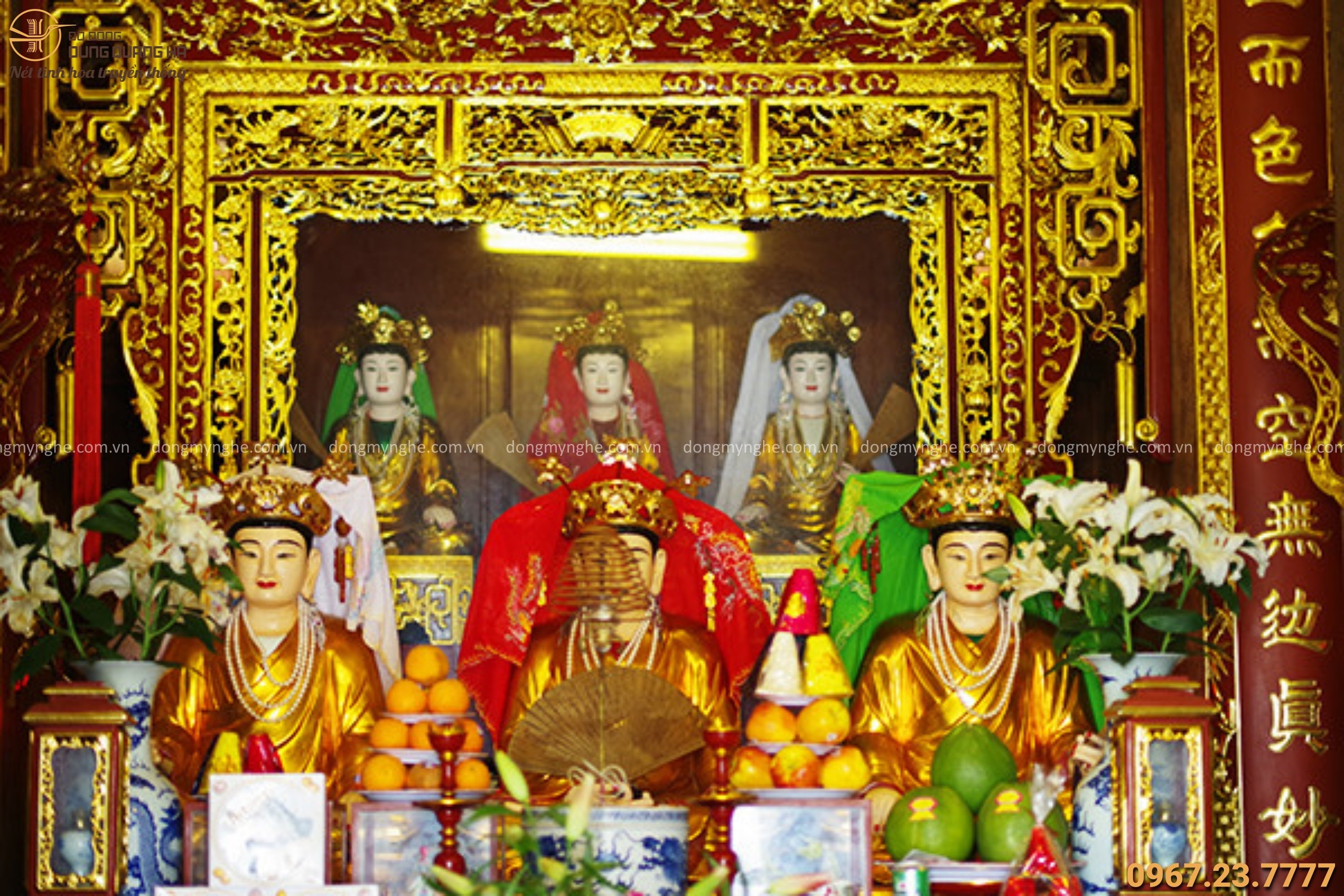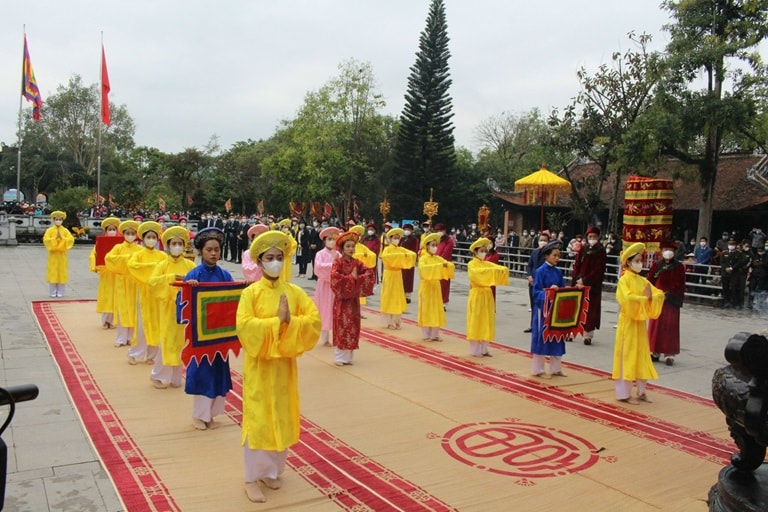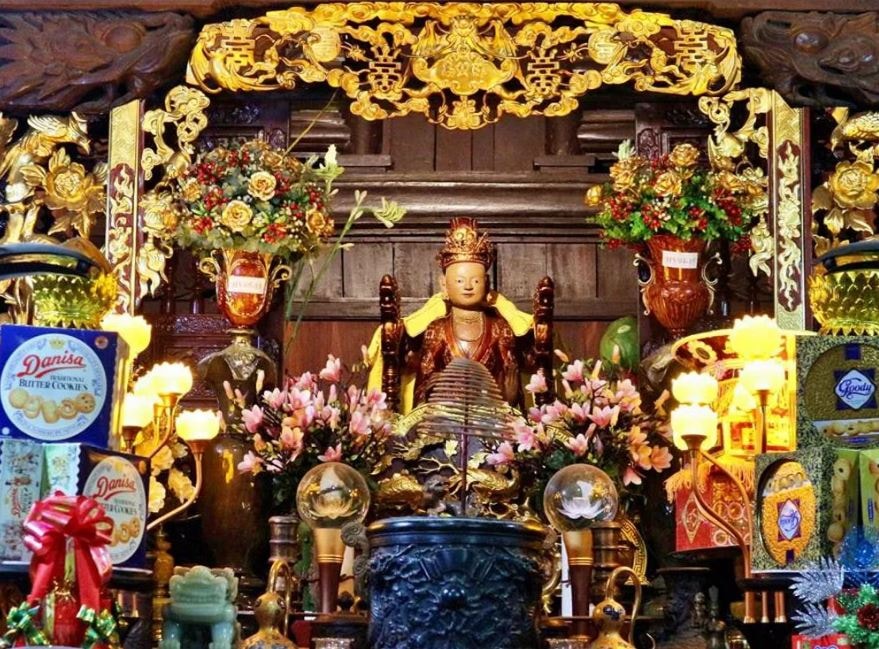Mother Au Co in the life of Mother worship in Vietnam
(Baonghean.vn) - Coming to the Ancestral Land of Phu Tho province today, we can easily contemplate the religious beliefs about the National Mother Au Co - the great Mother of the nation.
Belief in gods who have contributed to the country has been a unique cultural feature of the Vietnamese people for thousands of years. Along with daily activities that have been repeated throughout history to the present day, rituals to honor the gods have become customs and practices that demonstrate the traditional morality of remembering the source of water when drinking water. Practices in festivals, folk rituals, stories about gods, saints, land and people... have always been preserved and passed down by the community to become unique cultural features of the Vietnamese countryside.
 |
| Mother Goddess worship. |
The beliefs of generations of people have made the thousand-year history of the nation become close, familiar and closely connected to their colorful daily lives. Coming to the Ancestral Land of Phu Tho province today, we can easily contemplate the religious beliefs of the National Mother Au Co - the great Mother of the nation.
The National Mother Au Co is a symbol that has entered the history of Vietnamese culture along with the National Ancestor Lac Long Quan. The legendary couple became the Father - Mother of the nation when they gave birth to a sac of one hundred eggs. From the hundred eggs hatched a hundred healthy, strong and talented sons. The above romantic legend has entered the history of the nation along with the two words compatriots (born from the same sac) in the pride of the Dragon's children, the Fairy's grandchildren, the Hung King's lineage of the brilliant Dong Son Civilization era.
 |
| Mother Goddess Au Co is a symbol that goes down in the history of Vietnamese culture. |
Primitive agriculture gradually replaced the primitive hunting/shooting and gathering methods. The culture of planting and raising poultry and livestock reflected the process of the ancient Vietnamese people gradually moving down to the delta to form a state. The mountainous and deep forested areas gradually receded so that Father Lac Long Quan could conveniently lead 50 children to the sea and Mother Au Co led 50 children to the mountains when the hundred children were old enough. Legend has it that Father Lac Long Quan told Mother Au Co: “I am the Dragon race leading the water race, you are the Fairy race living mainly on land, water conquers fire, although the yin and yang energies combine to give birth to a hundred children, it is difficult to be united because different races cannot live together for long”.
The documents of the Au Co Temple also recorded the journey of Mother Au Co and her 49 children along the riverbank to the upstream. Along the way, some people chose to stop at a section of the river to fish, others stayed on the shore to grow trees and pick fruit... from there villages gradually formed. The eldest son ascended the throne, took the reign name of the first Hung King, named the country Van Lang, and established the capital in Phong Chau. Finally, Mother Au Co and the few remaining sons decided to stop at the beautiful, picturesque Hien Luong land to open up new lands and establish settlements. Mother and her children taught people to grow rice, plant trees, raise silkworms and weave cloth... gradually, life became prosperous over time.
The memories of the people of Hien Luong commune, Ha Hoa district for generations still remember the ancient places such as Thi hill, Cay Dau hill, Loan well, Phuong well,... and they deeply remember the story of the red silk strip that Mother Au Co left for her descendants before flying to the Fairyland after the jubilant Tet holiday on the 7th of January in the past. That is where the current Au Co Temple is built - the sacred house to worship the Mother. Like many mothers, Mother Au Co gave birth to the Fairy - Dragon race and protected, taught, and supported like the first Mother of the Land, the goddess who taught people to settle down, do agriculture, take advantage of the power of the land to grow crops, raise livestock to stabilize their lives.
Mothers give birth to their children and nurture them with care, intelligence, love and labor. Mothers are the source of charity, the spirit of solidarity and mutual assistance between Brothers and Sisters, Children and Grandchildren, and fellow countrymen, who are born from the same womb and know how to help each other in times of difficulty and adversity. Mothers give birth to humans and regenerate humans through labor, creativity and passing on their skills. At the same time, Mothers protect and watch over the joys of life, the sorrows and difficulties caused by natural disasters and enemies. Thus, along with the belief in animism, the worship of the primordial gods and goddesses, originating from the Father and Mother of the nation's origin, has increasingly permeated folk life.
 |
| Performing the female worship ceremony in the Au Co Temple Festival. |
Later, during the reign of King Le Thanh Tong (1442-1497), the temple of Mother Au Co was built by her descendants to commemorate the National Mother and organize cultural practices according to local customs and practices. In 1991, the temple of Mother Au Co was recognized by the Ministry of Culture as a national historical and cultural relic. On January 23, 2017, the Ministry of Culture, Sports and Tourism issued a Decision to recognize the worship of Mother Au Co as a National Intangible Cultural Heritage. On January 15, 2020, the Prime Minister decided to recognize the statue of Mother Au Co (dating from the 19th century, worshiped at Mother Au Co Temple, Hien Luong Commune, Ha Hoa District) as a National Treasure.
The “Tien Giang” festival, on the 7th day of the first lunar month every year, is a solemn holiday expressing gratitude to the Mother Goddess with typical agricultural offerings including rice cakes, sticky rice, sweet tea, and fresh flowers and fruits of the locality. The ritual practices, processions, and games reflect the joyful, prosperous, and happy folk life thanks to the sacred protection of the Mother Goddess and the ancestors of the race, the National Ancestor Lac Long Quan, and the Hung Kings who built and defended the country.
 |
The national treasure, the statue of Mother Au Co, is being worshiped at the Mother Au Co Temple, Hien Luong Commune, Ha Hoa District. |
Mother Au Co is not only worshiped directly in Ha Hoa district, Phu Tho province but also expanded to other places. The sacred temple worshiping Mother Au Co was started to be built in the Hung Temple Historical Relic Site in September 2001 and inaugurated in January 2005. The Hung Temple Historical Relic Site, the National Ancestor Lac Long Quan Temple, and the Mother Au Co Temple are places where the quintessence of the Vietnamese Ancestor worship and the Hung King lineage in Vietnam converge with the deepest respect, the most sacred festival associated with the Hundred Gods. In the respect for the Hung Kings, the respect for Father Lac Long Quan and Mother Au Co takes place throughout the year but is concentrated on the occasion of the Hung King's death anniversary on the 10th day of the 3rd lunar month. The international recognition when UNESCO listed the Hung King worship as a representative cultural heritage of humanity further strengthens the belief, love, and respect for Mother Au Co - Mother of life and tolerance in the minds and cultural practices as well as the ethics of the Vietnamese people.
The image of Mother Au Co - the origin of the great Mother of the Country in the land of the Hung Kings, together with the Mothers who created the universe of the Mother worship belief in Vietnam, whether she is the Mother who governs the high mountains, the plains, the rivers, the seas, or the high layers of the universe to the galaxies... the Mothers/Mothers are always present and accompany their descendants, especially associated with the sacred and bustling times of the community festivals, will forever be a unique cultural feature not only of Vietnam but also the pride of the cultural heritages representing the humanistic progress of humanity.

